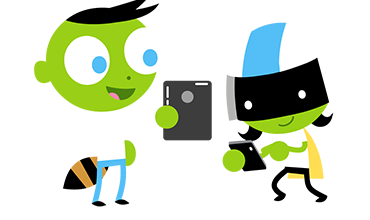I have a pretty nice job in that every so often, in the midst of thinking about getting PBS resources to the public, I have to ask myself, “Is it fun?” No matter the educational value, our resources will not gain a following if they don’t bring joy.
The “gamification” of learning, or the building of important knowledge and skills into games, does not always translate into fun. Likewise, games that claim they’re educational aren’t always so, even if they are great fun. Here are some tips to see whether games have value beyond entertainment.
- Getting better: If the player improves at game play, can they describe how they are improving, and do those skills translate into other areas of life? From a very young age, kids can recognize patterns, build on prior knowledge and make new discoveries in the course of game play. Adults can help kids articulate what they are observing and learning, then encourage them to think about strategy on higher levels.
- Role models: Part of being a kid is trying on the identities of heroes. If kids are playing games in group settings, they pick up behaviors not only of the game characters but of their fellow gamers. Do you like what you’re seeing? If not, you may need to steer your kids to more positive examples.
- Creative play: Some games allow kids to create in unlimited ways, such as design mode in Minecraft, game design in PBS Kids Scratch Jr. or simple draw/paint programs. Good adventure games offer tons of choice in problem-solving scenarios. The degree to which your choices are constrained in a game (to swipe the fruit, or not?) is usually a pretty good indicator of how cognitively challenging that game is.
Common Sense Media Is a free resource for parents and caregivers. It offers comprehensive reviews of games and other kinds of media for younger audiences. Check it out at commonsensemedia.org.
Benjamin Kramer, PhD, is the director of education for Austin PBS.















